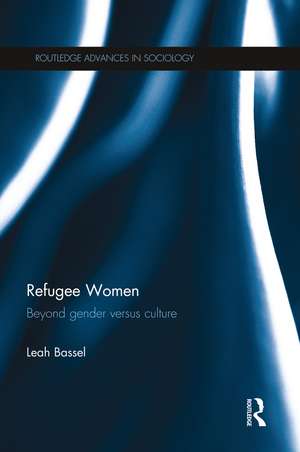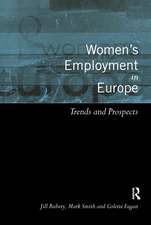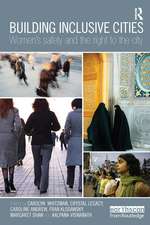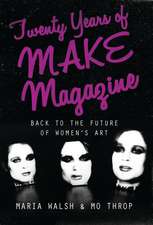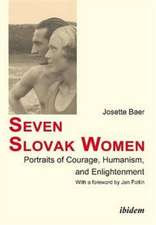Refugee Women: Beyond Gender versus Culture: Routledge Advances in Sociology
Autor Leah Basselen Limba Engleză Paperback – 14 mar 2014
In Refugee Women: Beyond Gender versus Culture, new theoretical perspectives recast both the story told and who tells the tale. By focusing on the politics underlying how these debates are framed and the experiences of women at the heart of these controversies, women are considered first and foremost as democratic agents rather than actors in the ‘culture versus gender’ script. Crucially, the institutions and processes created to address women’s needs are critically assessed from this perspective.
Breaking from scholarship that focuses on whether the accommodation of culture and religion harms women, Bassel argues that this debate ignores the realities of the women at its heart. In these debates, Muslim women are constructed as silent victims. Bassel pleads compellingly for a consideration of women in all their complexity, as active participants in democratic life. The book will appeal to students and scholars throughout the social sciences, particularly of sociology, political science and women’s studies.
| Toate formatele și edițiile | Preț | Express |
|---|---|---|
| Paperback (1) | 484.08 lei 6-8 săpt. | |
| Taylor & Francis – 14 mar 2014 | 484.08 lei 6-8 săpt. | |
| Hardback (1) | 1056.47 lei 6-8 săpt. | |
| Taylor & Francis – 18 iun 2012 | 1056.47 lei 6-8 săpt. |
Din seria Routledge Advances in Sociology
-
 Preț: 385.11 lei
Preț: 385.11 lei -
 Preț: 152.39 lei
Preț: 152.39 lei -
 Preț: 309.12 lei
Preț: 309.12 lei - 20%
 Preț: 296.88 lei
Preț: 296.88 lei -
 Preț: 334.09 lei
Preț: 334.09 lei -
 Preț: 204.46 lei
Preț: 204.46 lei - 9%
 Preț: 865.99 lei
Preț: 865.99 lei -
 Preț: 310.81 lei
Preț: 310.81 lei -
 Preț: 326.40 lei
Preț: 326.40 lei -
 Preț: 311.41 lei
Preț: 311.41 lei - 8%
 Preț: 388.98 lei
Preț: 388.98 lei -
 Preț: 288.87 lei
Preț: 288.87 lei -
 Preț: 310.29 lei
Preț: 310.29 lei -
 Preț: 311.41 lei
Preț: 311.41 lei -
 Preț: 303.43 lei
Preț: 303.43 lei -
 Preț: 301.51 lei
Preț: 301.51 lei -
 Preț: 326.63 lei
Preț: 326.63 lei -
 Preț: 152.30 lei
Preț: 152.30 lei -
 Preț: 318.95 lei
Preț: 318.95 lei -
 Preț: 317.48 lei
Preț: 317.48 lei -
 Preț: 312.86 lei
Preț: 312.86 lei -
 Preț: 160.59 lei
Preț: 160.59 lei -
 Preț: 334.09 lei
Preț: 334.09 lei -
 Preț: 309.46 lei
Preț: 309.46 lei -
 Preț: 386.78 lei
Preț: 386.78 lei - 8%
 Preț: 388.92 lei
Preț: 388.92 lei -
 Preț: 310.60 lei
Preț: 310.60 lei -
 Preț: 309.99 lei
Preț: 309.99 lei -
 Preț: 310.51 lei
Preț: 310.51 lei -
 Preț: 283.77 lei
Preț: 283.77 lei -
 Preț: 327.36 lei
Preț: 327.36 lei -
 Preț: 295.10 lei
Preț: 295.10 lei - 8%
 Preț: 383.57 lei
Preț: 383.57 lei - 18%
 Preț: 1111.55 lei
Preț: 1111.55 lei -
 Preț: 445.38 lei
Preț: 445.38 lei - 18%
 Preț: 701.88 lei
Preț: 701.88 lei - 18%
 Preț: 1053.92 lei
Preț: 1053.92 lei - 18%
 Preț: 1002.36 lei
Preț: 1002.36 lei - 18%
 Preț: 1057.89 lei
Preț: 1057.89 lei - 20%
 Preț: 248.31 lei
Preț: 248.31 lei - 18%
 Preț: 1003.30 lei
Preț: 1003.30 lei - 18%
 Preț: 1109.21 lei
Preț: 1109.21 lei - 18%
 Preț: 998.56 lei
Preț: 998.56 lei - 18%
 Preț: 1061.22 lei
Preț: 1061.22 lei - 18%
 Preț: 1058.06 lei
Preț: 1058.06 lei - 18%
 Preț: 1002.36 lei
Preț: 1002.36 lei - 18%
 Preț: 1113.12 lei
Preț: 1113.12 lei
Preț: 484.08 lei
Nou
Puncte Express: 726
Preț estimativ în valută:
92.66€ • 100.68$ • 77.88£
92.66€ • 100.68$ • 77.88£
Carte tipărită la comandă
Livrare economică 21 aprilie-05 mai
Preluare comenzi: 021 569.72.76
Specificații
ISBN-13: 9781138020139
ISBN-10: 1138020133
Pagini: 232
Dimensiuni: 156 x 234 x 12 mm
Greutate: 0.33 kg
Ediția:1
Editura: Taylor & Francis
Colecția Routledge
Seria Routledge Advances in Sociology
Locul publicării:Oxford, United Kingdom
ISBN-10: 1138020133
Pagini: 232
Dimensiuni: 156 x 234 x 12 mm
Greutate: 0.33 kg
Ediția:1
Editura: Taylor & Francis
Colecția Routledge
Seria Routledge Advances in Sociology
Locul publicării:Oxford, United Kingdom
Public țintă
Postgraduate and ProfessionalCuprins
Preface. Acknowledgments 1. Introduction Part 1: Theoretical Perspectives and Tools 2. Changing the Subject 3. Frame Making, Frame Breaking Part 2: Politics Within 4. The French 'Headscarf Debates' 5. The Religious Arbitration Debate in Ontario, Canada Part 3: Politics In Between 6. Confronting the Politics of the Frame in Canada 7. Gender at the Borders in France 8. Race, Class and Gender Hierarchies: Intersecting Challenges and Opportunities 9. Frame Shattering 10. Conclusion. Appendix: Fieldwork
Notă biografică
Leah Bassel is New Blood Lecturer in Sociology at Leicester University. Her work, which focuses on the political sociology of gender, migration and citizenship, has been published in journals including Ethnicities, Government and Opposition and Politics & Gender. She is Assistant Editor of Citizenship Studies.
Descriere
Debates over the headscarf and niqab, so-called ‘sharia-tribunals’, Female Genital Operations and forced marriages have raged in Europe and North America in recent years, raising the question – does accommodating Islam violate women’s rights? The book takes issue with the terms of this debate. It contrasts debates in France over the headscarf and in Canada over religious arbitration with the lived experience of a specific group of Muslim women: Somali refugee women. Breaking from scholarship that focuses on whether the accommodation of culture and religion harms women, Bassel pleads compellingly for a consideration of women in all their complexity, as active participants in democratic life.
